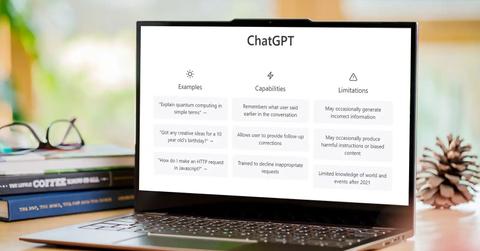
With Great Computing Power Comes Great Responsibility: 5 Do’s and Don’t of ChatGPT
The recent release of new large language models like Google’s Gemini and Anthropic’s Claude have accelerated the integration of artificial intelligence into our daily lives.
By Catherine McGrathMarch 20 2024, Published 9:49 a.m. ET
Still, OpenAI’s ChatGPT is the only LLM that has become a household name. It is one of the fastest-growing services ever, according to The Verge, attracting 100 million weekly users as of November 2023. While the software makes certain tasks easier it has some pretty serious flaws that could cause major problems. Therefore, it is important to understand ChatGPT’s proper uses and potential limitations. Below are five do’s and don'ts of ChatGPT that will make daily life more efficient and prevent negative outputs.
DO’S
Do Write an Email
Some simple, daily tasks are so repetitive they become impossible to complete. Emails are one of these things. We have all spent way too much time sitting at the computer, contemplating the perfect way to word an email and overusing exclamation points to lighten the tone. One of ChatGPT’s greatest strengths is eloquent phrasing. With a more detailed version of a prompt like, “Write me an email to a colleague politely asking for an update on a project,” emailing becomes significantly easier.
Do Reformat Text
If your work involves reviewing PDFs, legal documents or other records that have specific formatting requirements, manually reformatting text may be a mind-numbing part of your day. ChatGPT can help instantaneously eliminate frustrating indentations, capitalizations, and headings increasing readability. Try a prompt like this: “Reformat this text so that the all capital letters are lowercase.”
Do Fill in the Blank
ChatGPT is trained on the internet’s collective knowledge. Because of this, it has an extensive vocabulary that combined with its user interface make it a conversational thesaurus. When writer's block occurs and you can’t find the appropriate word or phrase, ChatGPT is here to help. In the place of the word or phrase, place two or three underscores like this: “When I arrived in Rome, I felt ___.” Copy and paste this into ChatGPT and prompt it to “fill in the blank.” If you don't get the word you hoped for, don't be afraid to ask for a new word that evokes a different feeling.
Do Make a Recipe
When you want to make dinner but don’t have many groceries, it can be difficult to come up with a recipe from scratch. ChatGPT can help you utilize everything in your kitchen for a delicious meal. List all of the ingredients you have and ask, “What can I make with these ingredients for dinner?” ChatGPT will provide creative options and detailed instructions.
Do Generate a Travel Itinerary
Planning a trip to a place you’ve never been can be difficult and confusing. The process involves a lot of time and research that you may not have. While ChatGPT cannot physically book flights and hotels, it can generate a detailed itinerary with hotel, flight, restaurant and activity recommendations. It can suggest the best areas to stay and the optimal time of year to travel. It can give you a packing list and a guide to the native culture. While ChatGPT can kickstart the planning, be sure to double check this information yourself.
DON’TS
Don’t Use it like Google
ChatGPT has been known to get things wrong or make them up entirely. It is imperative that users do their own research and not rely on the information provided by ChatGPT.
Don’t Use it to Remain Informed About Current Events
OpenAI has limited ChatGPT’s training data to information up to January 2022. Therefore, users cannot stay up to date on recent news with ChatGPT. When asked to provide the most important events from today, ChatGPT responded, “I'm sorry for any inconvenience, but as an AI, I don't have real-time browsing capabilities or access to current news.”
Don’t Ask for Medical Advice
This may seem obvious but it is important to know that ChatGPT cannot provide the same expertise as your doctor. If you feel sick, asking ChatGPT may have the same effect as Googling it: providing false diagnoses and causing unnecessary health anxiety. Just ask your doctor.
Don’t Give it Your Personal/Confidential Information
While conversations with ChatGPT might feel private, they are definitely not. Don’t ever give ChatGPT any personal or confidential information you wouldn't be comfortable being on the internet. OpenAI’s privacy policy makes clear that the company saves your conversations.
Don’t Copy and Paste Generated Content from ChatGPT
It may be tempting to copy and paste outputs from ChatGPT but it is important to hesitate before you do. Do you know your company’s rules on AI use? Will this have consequences you haven’t contemplated? Could this perpetuate misinformation? Should you credit the information to ChatGPT?

